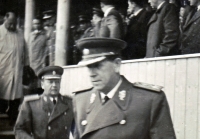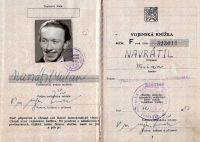The most important thing is to have character, everything else is only temporary

Download image
Milan Navrátil was born on September 12, 1930 in Pilsen. His father František was a non-commissioned officer in the Czechoslovak army and worked as an instructor at a military academy. He lost his job after the Nazi occupation, when the Czechoslovak army was disbanded and the family with four children lost a crucial source of livelihood. Therefore, František Navrátil founded a photography studio in Blovice, a small town located southeast of Pilsen. The whole family subsequently moved to Blovice and lived through the war period relatively peacefully. At its end, Blovice found itself near the demarcation line, Milan remembers the arrival of American and Soviet soldiers. After the war, he graduated from photography school and after graduating, he started working in his father’s studio. The successful operation of the studio was interrupted only by the arrival of the communists, the studio became one of the nationalized Fotografia cooperatives, and the Navrátils could only remain in it as its employees. In 1951, both Milan and his older brother were called up for basic military service. As the sons of a tradesman and practicing Catholics with a dismissive attitude towards the new conditions, they spent the military service in the Auxiliary Engineering Corps. Their father also received a call-up order to the AEC. After returning from the military service, Milan joined the Pilsen branch of the once famous Langhans studio, he also briefly became a reportage photographer and eventually took over from his father to run the portrait studio in Blovice. Together with his wife, he was managing the studio until he retired. With great interest, he searched for new procedures in photo processing, which he was able to bring to artisanal perfection, for which he was repeatedly awarded at international competitions. He lived a large part of his life in the period of communism, towards which he had a very negative attitude. He had a hard time when Czechoslovakia was occupied by the troops of the Warsaw Pact and he documented the arrival of Soviet soldiers in Blovice in many pictures. He also photographed events in November 1989 and at the same time actively participated in public events. He became one of the founding members of the Civic Forum in Blovice and was also a member of the local government for one term. At that time, the studio was also returned to the ownership of the original owners, and Milan Navrátil continued to run it successfully. He still lives in Blovice, in the family house, where the Navrátils built a new studio, the family tradition is now being carried on by Milan Navrátil’s daughter.



